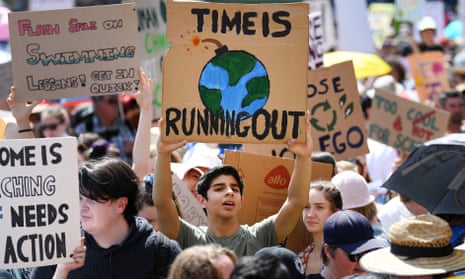In September 2019, people from all walks of life stood together, waving banners and leading chants, to demand action on climate change. Across Australia, 300,000 people gathered outside parliaments, in parks and on the streets for the climate strike, creating the largest climate protest in our nation’s history.
We envisioned a different future. A future with no new coal, oil or gas projects, 100% renewable energy generation and exports, and a just transition where workers and marginalised communities are supported. Without these changes, we feared a future of melting ice caps, bleached coral, eroding beaches, dangerous heat waves and perpetual bushfires.
We didn’t expect the future that we’re in now. Young people in Australia have lost the freedom that we once took for granted. While in lockdown, we’ve been living, working, studying and socialising within the same four walls, usually while staring at the same little box you’re looking at now. Even for those of us who have come out of lockdown, our world and the possibilities within it have shrunk. Our fears about the effects of climate change now sit alongside the fear of becoming sick from Covid-19, passing it on to our families, the possibility of our marks being affected by studying at home, the likelihood that there won’t be any jobs for us and the debt our generation will be left with once this is all over.
We’ve seen government and businesses respond to Covid-19 in a way that we haven’t seen them respond to climate change. Our systems for living, eating, working and healthcare changed radically in a matter of weeks. The increase to jobseeker and the introduction of the jobkeeper payment has supported millions across the country. Covid-19 revealed that the government has the capacity and capability to respond to and prevent crises with the urgency, and at the scale, required.
Just as the Covid-19 figures around the country were starting to look up, we’ve seen an outbreak in Victoria which has forced many of us back into lockdown. It’s been a stark reminder that we cannot return to the normality that we knew. The solutions of yesterday – such as coal and gas – are not the solutions that we need to prevent further risks to our future. To return to these profit-driven solutions is to reinforce the systems and institutions which led us here – systems that allow the rich to prosper at the expense of the poor, where profit and short-term economic gains are valued over the social and environmental wellbeing of current and future generations.
We can’t simply return to business as usual. The pandemic has presented us with an opportunity to pave a new way forward. To reflect and rebuild towards a society that can adequately mitigate and adapt to the threats that confront humanity now, and into the future. The Commission for the Human Future, in their report Surviving and Thriving in the 21st Century, have identified 10 catastrophic threats which we must address if we are to secure our collective future. These threats include not only pandemics and climate change, but nuclear weapons, scarcity of natural resources, collapse of life-supporting ecosystems, human population growth, pollution, food insecurity, and emerging technologies.
By acknowledging the interconnected nature of many of these threats, the commission recognises that they often come from common causes and have common solutions. For example, stopping deforestation would also reduce the likelihood of novel diseases, protect ecosystems which support animal life, increase food security and mitigate climate change through carbon sequestration. Furthermore, improving international cooperation could alleviate risks from catastrophic climate change, nuclear war, pandemics and pollution.
As we recover from Covid-19, young people are demanding we take this opportunity to implement systematic changes. Our future hangs in the balance. We must ensure that the decisions made today address these interconnected threats identified by the commission, and lay the foundations for a cleaner, fairer, more secure tomorrow that doesn’t retreat to business-as-usual.
Rachel Hay is a climate activist and arts/law student from southern Tasmania
